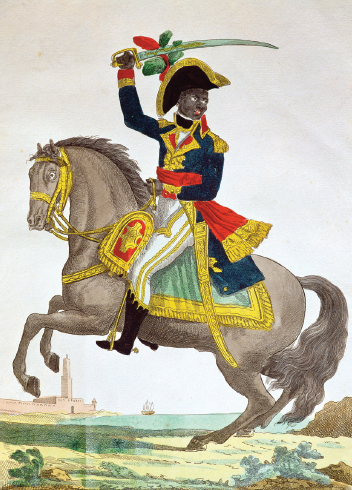Individuals in Society: Toussaint L’Ouverture

Equestrian portrait of Toussaint L’Ouverture. (Bibliothèque Nationale, Paris, France/Archives Charmet/The Bridgeman Art Library)
Little is known of the early life of Saint-Domingue’s brilliant military and political leader Toussaint L’Ouverture. He was born in 1743 on a plantation outside Le Cap owned by the Count de Bréda. According to tradition, L’Ouverture was the eldest son of a captured African prince from modern-day Benin. Toussaint Bréda, as he was then called, occupied a privileged position among slaves. Instead of performing backbreaking labor in the fields, he served his master as a coachman and livestock keeper. He also learned to read and write French and some Latin, but he was always more comfortable with the Creole dialect.
During the 1770s the plantation manager emancipated L’Ouverture, who subsequently leased his own small coffee plantation, worked by slaves. He married Suzanne Simone, who already had one son, and the couple had another son during their marriage. In 1791 he joined the slave uprisings that swept Saint-Domingue, and he took on the nom de guerre (war name) L’Ouverture, meaning “the opening.” L’Ouverture rose to prominence among rebel slaves allied with Spain and by early 1794 controlled his own army. A devout Catholic who led a frugal and ascetic life, L’Ouverture impressed others with his enormous physical energy, intellectual acumen, and air of mystery. In 1794 he defected to the French side and led his troops to a series of victories against the Spanish. In 1795 the National Convention promoted L’Ouverture to brigadier general.
Over the next three years L’Ouverture successively eliminated rivals for authority on the island. First he freed himself of the French commissioners sent to govern the colony. With a firm grip on power in the northern province, L’Ouverture defeated General André Rigaud in 1800 to gain control in the south. His army then marched on the capital of Spanish Santo Domingo on the eastern half of the island, meeting little resistance. The entire island of Hispaniola was now under his command.
With control in his hands, L’Ouverture was confronted with the challenge of building a post-emancipation society, the first of its kind. The task was made even more difficult by the chaos wreaked by war, the destruction of plantations, and bitter social and racial tensions. For L’Ouverture the most pressing concern was to re-establish the plantation economy. Without revenue to pay his army, the gains of the rebellion could be lost. He therefore encouraged white planters to return and reclaim their property. He also adopted harsh policies toward former slaves, forcing them back to their plantations and restricting their ability to acquire land. When they resisted, he sent troops across the island to enforce submission. L’Ouverture’s 1801 constitution reaffirmed his draconian labor policies and named L’Ouverture governor for life, leaving Saint-Domingue as a colony in name alone. In June 1802 French forces arrested L’Ouverture and jailed him at Fort de Joux in France’s Jura Mountains near the Swiss border. He died of pneumonia on April 7, 1803, leaving his lieutenant, Jean Jacques Dessalines, to win independence for the new Haitian nation.
- Toussaint L’Ouverture was both slave and slave owner. How did each experience shape his life and actions?
- What did L’Ouverture and Napoleon Bonaparte have in common? How did they differ?
How did the French Revolution affect France’s Caribbean colonies? Examine reactions of slaves and free men of color to the French Revolution, and then complete a quiz and writing assignment based on the evidence and details from this chapter. See Document Project for Chapter 22

